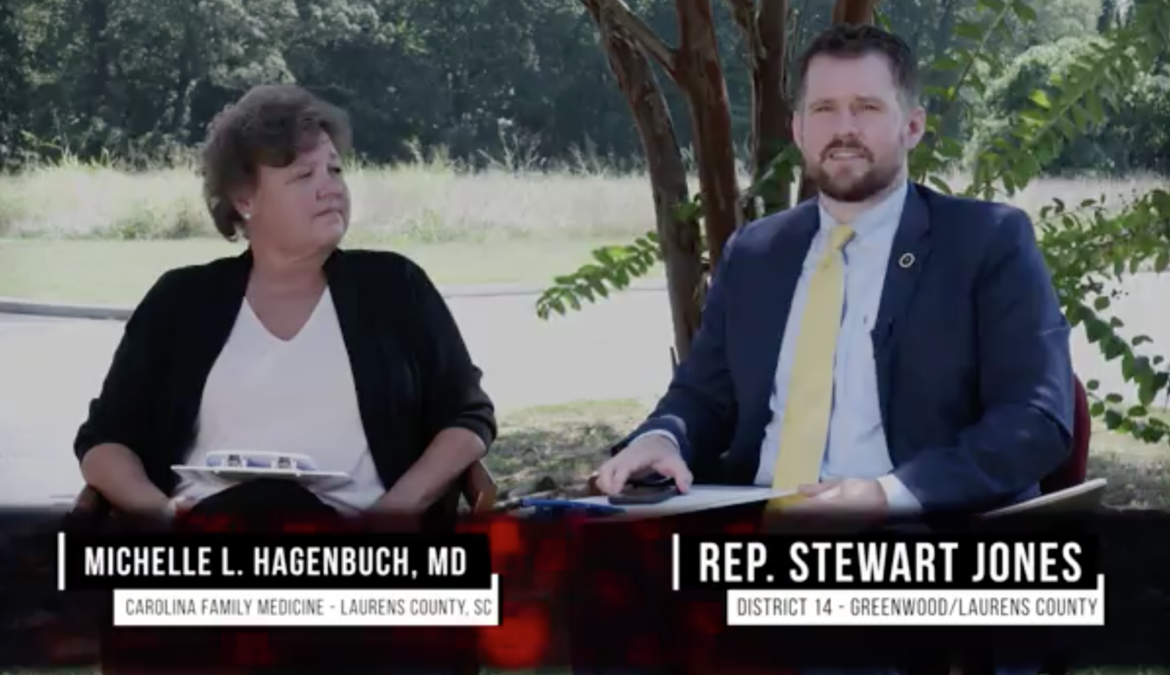COLUMBIA, S.C. (Dec. 16, 2020) – Two bills introduced in the South Carolina House would ban the enforcement of any federal mask mandate and prohibit the state from taking any federal funding connected to a federal mask or vaccine mandate. Passage of these bills would set the stage to nullify any federal maks or vaccine mandates in practice and effect.
Rep. Stewart Jones (R-Laurens) filed House Bill 3126 (H3126) on Dec. 9. The legislation would ban the state or any of its political subdivisions from accepting federal funds “to enforce an unlawful federal mask mandate or unlawful federal vaccine mandate.” The bill includes a detailed definition of “unlawful” mandates that covers virtually any law, rule, regulation, or executive order from any agency or branch of the federal government.
Jones, along with Rep. Bill Chumley (R-Spartanburg) and Rep. Mike Burns (R-Greenville) introduced House Bill 3218 (H3218) the same day. The legislation would prohibit state and local officials in South Carolina from participating in the enforcement of “any unlawful federal mask mandate that violates the Tenth Amendment of the United States Constitution.” “Unlawful federal mask mandate” is defined as “any federal law, order, rule, regulation, plan of action, or otherwise which requires a resident of the State of South Carolina to wear a face mask or other face-covering to minimize the spread of COVID-19 or any other infectious disease.” Any state or local official violating the law would be subject to a $2,000 fine.
EFFECTIVE
The federal government relies heavily on state cooperation to implement and enforce almost all of its laws, regulations and acts. A mask or vaccine mandate would be no different. By simply withdrawing this necessary cooperation, states and localities can nullify many federal actions in effect. As noted by the National Governors’ Association during the partial government shutdown of 2013, “states are partners with the federal government on most federal programs.”
Based on James Madison’s advice for states and individuals in Federalist #46, a “refusal to cooperate with officers of the Union” is an extremely effective method to effectively nullify any future federal mask or vaccine mandate because most enforcement actions rely on help, support and leadership from state and local governments. Without state and local enforcement action, the ban would quickly fall apart in South Carolina.
Prohibiting the state from accepting funding related to masks or vaccine mandates is important because that is the most likely pathway the Biden administration would take to try to implement a federal mask or vaccine program. Even the mainstream concedes that a national mask mandate would be unconstitutional and impossible to enforce. Lawrence Gostin, director of Georgetown University’s O’Neill Institute for National and Global Health Law admitted as much to USA Today.
“A national mandate is not possible because public health powers belong to the states, not the federal government. The federal government couldn’t implement its own mask mandates, nor could it force the states to do it.”
Instead, Biden has floated the idea of “appealing to governors and local officials.” Funding would almost certainly be used as a carrot or a stick. USA Today reported, “Biden also could require states to follow Centers for Disease Control and Prevention guidance to qualify for certain federal funds.”
A legislative prohibition on accepting such funding would tie the hands of the South Carolina governor and all local officials. With state agencies unable to accept funding and prohibited from enforcing the policies, these two bills together would effectively nullify any federal mask mandate in practice and effect.
LEGAL BASIS
The state of South Carolina can legally bar state agents from enforcing federal mask or vaccine mandates. Refusal to cooperate with federal enforcement rests on a well-established legal principle known as the anti-commandeering doctrine.
Simply put, the federal government cannot force states to help implement or enforce any federal act or program. The anti-commandeering doctrine is based primarily on five Supreme Court cases dating back to 1842. Printz v. U.S. serves as the cornerstone.
“We held in New York that Congress cannot compel the States to enact or enforce a federal regulatory program. Today we hold that Congress cannot circumvent that prohibition by conscripting the States’ officers directly. The Federal Government may neither issue directives requiring the States to address particular problems, nor command the States’ officers, or those of their political subdivisions, to administer or enforce a federal regulatory program. It matters not whether policy making is involved, and no case by case weighing of the burdens or benefits is necessary; such commands are fundamentally incompatible with our constitutional system of dual sovereignty”
WHAT’S NEXT
Both bills will be officially introduced when the South Carolina legislature convenes on Jan. 12. H3126 will be referred to the House Committee on Ways and Means and H3218 will be referred to the House Committee on Judiciary. Both will have to pass their respective committees by a majority vote before moving forward in the legislative session.
Originally appeared in Tenth Amendment Center.




